Sandy Fussell's Blog, page 15
December 11, 2012
The Next Big Thing
The Next Big Thing is a chain of book and author recommendations.Richard Harland tagged me on his blog and now it's my turn. Check out the books by the people I tagged at the end of this post
 What is the [working] title of your next book?
What is the [working] title of your next book? Black Tengu, the eighth and final title in the Samurai Kids series.
Black Tengu, the eighth and final title in the Samurai Kids series.Where did the idea come from for the book?
The first book in the series, White Crane, was published in 2008. I had written it as a stand-alone novel but my publisher, Walker Books Australia, felt it would make a good series. I had to go back through White Crane looking for something that I could use as the arc for a series. I found a throwaway comment that Sensei had once made a terrible mistake. I had originally only included this because I did not want the wise, eccentric teacher to be perfect but it was destined for greater things and grew to become the link that ran through the whole series and is finally resolved in this last book.
What genre does your book fall under?
The Samurai Kids series is historical fiction, set in the mid-17th century when the golden age of the samurai was drawing to a close.
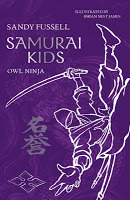
What actors would you choose to play the part of your characters in a movie rendition?
I am not sure how to answer this. It might require clever costuming as the main character has one leg, another boy has one arm – each character has a difficulty to overcome although this is not always physical. I’m sure there is a film company and actors out there who could meet the challenge. Maybe it would be an anime film so perhaps I should choose voices...


What is the one-sentence synopsis of your book?
In the harsh snow lands of Ezo, the Samurai Kids must find a way to help Sensei Kiyaga face the terrible secret from his past.
Will your book be self-published or represented by an agency?
The series is published by Walker Books Australia and I am represented by Pippa Masson of Curtis Brown.
How long did it take you to write the first draft of the manuscript?
It took longer to write this last book than any other in the series. The first draft took six months but there are many redrafts still ahead. I am found it a challenge to draft as I am not a plotter. I just write the stories my characterstell me. But in this book I had to follow the plotline I had spent seven prior books preparing. I did not find it easy but am happy with it.
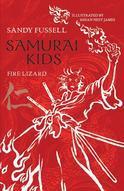 What other books would you compare this story to within your genre?
What other books would you compare this story to within your genre?The Samurai Kids series is often compared by reviewers to John Flanagan’s Rangers Apprentice and Brotherband series. I find this a wonderful compliment and wouldn’t want to suggest anything else!
Who or what inspired you to write this book?

I was thinking about what it would be like to be a samurai – as lovers of ancient history like me do! I knew that if you were born into a samurai family you had no choice but to serve. I began to wonder what it would be like for a boy (or a girl, there is one girl samurai in my books) who wasn’t very good at their lessons. And what if they weren’t very good because of something that wasn’t their fault. Like being born with one leg. That’s when my one-legged narrator, Niya, first spoke to me. “Give it a go,” he said. So I went down into my backyard, tucked up one leg and karate kicked. I found the beginning of my story. “My name is Niya Moto and I am the only one-legged samurai kid in Japan. Famous for falling flat on my face in the dirt.”
What else about the book might pique the reader's interest?
I think this question is best answered in terms of the series. The group of characters is unusual, the time of swords and battles is exciting, there is a strong focus on a range of martial arts, the children travel across Japan, China, Korea and Cambodia and the Zen humour is quirky. In short, most readers tell me it’s very different to any other books they’ve read.
Here are the authors I'd like to introduce, and who you can follow next Wednesday, when they answer the same questions...
George Ivanoff http://georgeivanoff.com.au/
Jodie Wells-Slowgrove http://www.ozkidswriter.com/writing-blog.html
Sheryl Gwyther http://sherylgwyther.wordpress.com/ Claire Saxby http://letshavewords.blogspot.com.au/
Published on December 11, 2012 18:28
October 23, 2012
My Favourite Blog Posts - How Facebook Changed My Life by Cassandra Golds
I like Facebook but am often called upon to defend why. This post is from one of my favourite Australian authors, Cassandra Golds (who wrote one of my all time favourite books - The Three Loves of Persimmon), and explains it much better than I ever could.
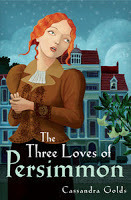
I often do speaking sessions about social media for writers and I always include a slide with quotes from Cassandra's post on it.
Here are some of my favourite excerpts:
People say that Facebook is superficial. The truth is that everybody approaches Facebook in a different way. Part of the fascination lies in the differences...
Some people post links to reviews or to articles on subjects they find interesting: I love this! Many people, including myself, share music videos from YouTube. How delightful it can be to be reminded of a long-forgotten song, or to discover that a Facebook friend has similar musical taste!
Some write progress reports on the novel they are writing ...
You have only to say something a little fragile on Facebook, or even to be absent for a while, to attract well-wishes, warm support, queries about your welfare and even personal offers of help. I have found it an immensely supportive community. And if you share an achievement — the publication of a book, for example, or a good review, you are showered with encouragement and affirmation.
There is also a lot of talk about cats and other furry animals...
In short, I haven't had so much fun in years. And I have never felt less alone.
I don't necessarily like everything about Facebook. I don't want play games or participate in survey-type quizzes. But sometimes I change my mind. One of the things I didn't initially like was the posting of birthday greetings. It just didn't seem to have the same sincerity as a card or a phone call. But then a funny thing happened - I had a birthday!!! The list of birthday messages made me smile - and I thoroughly enjoyed reading them. I realised that not only was it a good idea - it mattered to me after all.

I often do speaking sessions about social media for writers and I always include a slide with quotes from Cassandra's post on it.
Here are some of my favourite excerpts:
People say that Facebook is superficial. The truth is that everybody approaches Facebook in a different way. Part of the fascination lies in the differences...
Some people post links to reviews or to articles on subjects they find interesting: I love this! Many people, including myself, share music videos from YouTube. How delightful it can be to be reminded of a long-forgotten song, or to discover that a Facebook friend has similar musical taste!
Some write progress reports on the novel they are writing ...
You have only to say something a little fragile on Facebook, or even to be absent for a while, to attract well-wishes, warm support, queries about your welfare and even personal offers of help. I have found it an immensely supportive community. And if you share an achievement — the publication of a book, for example, or a good review, you are showered with encouragement and affirmation.
There is also a lot of talk about cats and other furry animals...
In short, I haven't had so much fun in years. And I have never felt less alone.
I don't necessarily like everything about Facebook. I don't want play games or participate in survey-type quizzes. But sometimes I change my mind. One of the things I didn't initially like was the posting of birthday greetings. It just didn't seem to have the same sincerity as a card or a phone call. But then a funny thing happened - I had a birthday!!! The list of birthday messages made me smile - and I thoroughly enjoyed reading them. I realised that not only was it a good idea - it mattered to me after all.
Published on October 23, 2012 14:00
My Favourite Blog Posts - How facebook Changed My Life by Cassandra Golds
I like Facebook but am often called upon to defend why. This post is from one of my favourite Australian authors, Cassandra Golds (who wrote one of my all time favourite books - The Three Loves of Persimmon), and explains it much better than I ever could.

I often do speaking sessions about social media for writers and I always include a slide with quotes from Cassandra's post on it.
Here are some of my favourite excerpts:
People say that Facebook is superficial. The truth is that everybody approaches Facebook in a different way. Part of the fascination lies in the differences...
Some people post links to reviews or to articles on subjects they find interesting: I love this! Many people, including myself, share music videos from YouTube. How delightful it can be to be reminded of a long-forgotten song, or to discover that a Facebook friend has similar musical taste!
Some write progress reports on the novel they are writing ...
You have only to say something a little fragile on Facebook, or even to be absent for a while, to attract well-wishes, warm support, queries about your welfare and even personal offers of help. I have found it an immensely supportive community. And if you share an achievement — the publication of a book, for example, or a good review, you are showered with encouragement and affirmation.
There is also a lot of talk about cats and other furry animals...
In short, I haven't had so much fun in years. And I have never felt less alone.

I often do speaking sessions about social media for writers and I always include a slide with quotes from Cassandra's post on it.
Here are some of my favourite excerpts:
People say that Facebook is superficial. The truth is that everybody approaches Facebook in a different way. Part of the fascination lies in the differences...
Some people post links to reviews or to articles on subjects they find interesting: I love this! Many people, including myself, share music videos from YouTube. How delightful it can be to be reminded of a long-forgotten song, or to discover that a Facebook friend has similar musical taste!
Some write progress reports on the novel they are writing ...
You have only to say something a little fragile on Facebook, or even to be absent for a while, to attract well-wishes, warm support, queries about your welfare and even personal offers of help. I have found it an immensely supportive community. And if you share an achievement — the publication of a book, for example, or a good review, you are showered with encouragement and affirmation.
There is also a lot of talk about cats and other furry animals...
In short, I haven't had so much fun in years. And I have never felt less alone.
Published on October 23, 2012 14:00
October 21, 2012
Tech Stuff for Writers - Postcron revisited
A friend read my post about Postcron and pointed out that Facebook allows you to schedule posts, so why would she use PostCron?

Two reasons - Facebook only allows scheduling for Pages. With Postcron, you can schedule posts for Pages and your timeline.
Better interface - If you have more than one Page, Facebook shows future scheduled posts separately on each page. With Postcron the information is all in one place, neatly organised under tabs.

Two reasons - Facebook only allows scheduling for Pages. With Postcron, you can schedule posts for Pages and your timeline.
Better interface - If you have more than one Page, Facebook shows future scheduled posts separately on each page. With Postcron the information is all in one place, neatly organised under tabs.
Published on October 21, 2012 15:00
October 20, 2012
Sandy Writes - The Detail is a Google
 Source: jpellgenI'm happy with my first paragraph. A bell tolls ominously over the snow. It sketches the setting with a light touch and it has the Samurai Kids feeling nervous and afraid. The reader knows something terrible is in the air.
Source: jpellgenI'm happy with my first paragraph. A bell tolls ominously over the snow. It sketches the setting with a light touch and it has the Samurai Kids feeling nervous and afraid. The reader knows something terrible is in the air.But as I read through my words for the tenth time - and yes there will be many more readings. I revise like Tolkien. I read once that the reason it took him so long to write - was partly because his works were so long and detailed - but partly because every time he got a little bit further along, he went back to the start and revised all over again.
I do that too. It makes for slow going but it works for me. I am an almost non-existent plotter and although I may have a very firm idea, the middle parts of the story are usually quite bare when I begin. So I need to revise iteratively and continually to maintain continuity as the story develops organically.
 Source: bthomsoAs I am reading my first paragraph again, it occurs to me for the first time, that perhaps my Kids are too far way from the bell they are hearing. How far does the toll of a bell reach? Who can tell me that? I grew up in Camden about 2km as the crow flies from St John's church. We could often hear the bells.
Source: bthomsoAs I am reading my first paragraph again, it occurs to me for the first time, that perhaps my Kids are too far way from the bell they are hearing. How far does the toll of a bell reach? Who can tell me that? I grew up in Camden about 2km as the crow flies from St John's church. We could often hear the bells.
But can I be further than 2 km away? Would sound travel a greater distance over the flatlands? Would snow absorb any sound? And what sort of bell was it anyway - in 17th century Japan?
So I type into Google: How far does a bell toll? One of the suggestions specifies time and place - the equivalent of pre-industrial early medieval Europe. It's a reasonable match. The link takes me to a forum. Some people comment from English villages about the bells they hear every day. Another takes a comment from Wikipedia about the bells of St Mary-le-bow and calculates the distance to the villages mentioned.
One person describes how flatlands amplify sound. Another tells the tale of a 12th century monastery resited because its bells were confused with those of another 2 km down a winding valley. Someone even explains the physics behind why an older bell rings louder over distance than today's bells.
Everything I needed to know was there. I figure given the landscape and the time of the bell I can safely set the distance between my kids and the castle anywhere from 2km to 4km. I don't need to be exact. I just need to be realistic.
Here is the link to the discussion on bells. Everything an armchair author needs to know! http://little-details.livejournal.com/1945635.html
Published on October 20, 2012 19:01
October 16, 2012
Creativity Quote # 1 - Steve Jobs
Creativity is just connecting things. When you ask creative people how they did something, they feel a little guilty because they didn't really do it, they just saw something. It seemed obvious to them after a while. That's because they were able to connect experiences they've had and synthesize new things - Steve Jobs
 Source: http://bornstoryteller.wordpress.com
Source: http://bornstoryteller.wordpress.com

 Source: http://bornstoryteller.wordpress.com
Source: http://bornstoryteller.wordpress.com
Published on October 16, 2012 00:10
October 14, 2012
Sandy Writes - In defence of the Thesaurus
 Cartoon by Dave Walker. at We Blog Cartoons.I'm always interested to read what other writers having to say about their writing process, I have a Pinterest Board for Writers On Writing where I have begun to pin my favourites. There's not a lot there at the moment so I'm looking for suggestions if you've got one to recommend.
Cartoon by Dave Walker. at We Blog Cartoons.I'm always interested to read what other writers having to say about their writing process, I have a Pinterest Board for Writers On Writing where I have begun to pin my favourites. There's not a lot there at the moment so I'm looking for suggestions if you've got one to recommend.Sometimes I find myself disagreeing, even with someone as talented as Stephen King. His books are wonderful and I learned so much from his On Writing: A Memoir of the Craft, but when I he said: "Any word you have to hunt for in a thesaurus is the wrong word. There are no exceptions to this rule", I had to shake my head. It's not like that for me at all.
I understand where he's coming from. The thesaurus is often consulted to find a 'better word' for a variety of reasons - more unique, more formal, more literary - and invariably a word chosen on such basis will ruin any sentence it is placed in.
But there are exceptions. There are are different ways to use a thesaurus. I open the thesaurus when the word I have in my head doesn't feel right - it doesn't match the feeling I have in my heart. I am rarely looking for a replacement word - I am looking for a different word that may set me thinking in a different direction. A word may lead to an image, almost never to a direct insertion.
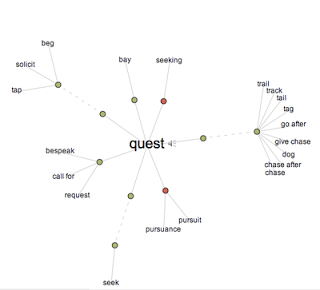 I particular like how the Visual Thesaurus works in this way. Sometimes the word I end up with is not a synonym by a long shot, but it is a word that feels like it fits or helps me to find a more fitting string of words. The Visual Thesaurus is an organic way to search for a word. As you step out along the nodes the correlation between word and meaning widens but the correlation between word and feel is not lessened.
I particular like how the Visual Thesaurus works in this way. Sometimes the word I end up with is not a synonym by a long shot, but it is a word that feels like it fits or helps me to find a more fitting string of words. The Visual Thesaurus is an organic way to search for a word. As you step out along the nodes the correlation between word and meaning widens but the correlation between word and feel is not lessened. Well, that's the way it works for me.

Published on October 14, 2012 16:00
October 11, 2012
Sandy Writes - In Defence of Short sentences
When I began to write I immediately noticed a major difference between the style that came naturally to me and the works of fiction I loved to read. My sentences were usually quite short. I was appalled that I couldn't get this simple thing right. I tried hard to improve - to model my writing on the work of authors I admired. But it just wouldn't happen.
When my first book was accepted for publication I thought perhaps it didn't really matter. But some months later, when I took my own book from my library shelf to read, I was disappointed all over again. It didn't read like a real book. It was full of short sentences.
In time, I've grown comfortable with those short sentences. I can still build beautiful images or fast action. It's all about how I string them together and I love writing them.
One of the websites I like to visit is Maria Popova's Brain Pickings. Today I discovered in her review of Several Short Sentences About Writing , these words of wisdom from another short sentence defender:
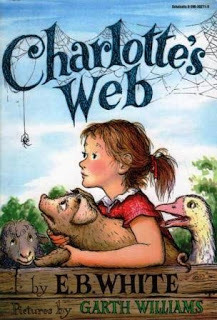
You can say smart, interesting, complicated things using short sentences.
How long is a good idea?
Does it become less good if it’s expressed in two sentences instead of one?
[…]
Writing short sentences will help you write strong, balanced sentences of any length. Strong, lengthy sentences are really just strong, short sentences joined in various ways.
E.B White was also a defender of short sentences. Another Brain Pickings post on that here.
And a final comment from Several Short Sentences about Writing by Verilyn Klinkenborg: The only link between you and the reader is the sentence you’re making.
The length of the sentence really doesn't matter after all.

When my first book was accepted for publication I thought perhaps it didn't really matter. But some months later, when I took my own book from my library shelf to read, I was disappointed all over again. It didn't read like a real book. It was full of short sentences.
In time, I've grown comfortable with those short sentences. I can still build beautiful images or fast action. It's all about how I string them together and I love writing them.
One of the websites I like to visit is Maria Popova's Brain Pickings. Today I discovered in her review of Several Short Sentences About Writing , these words of wisdom from another short sentence defender:

You can say smart, interesting, complicated things using short sentences.
How long is a good idea?
Does it become less good if it’s expressed in two sentences instead of one?
[…]
Writing short sentences will help you write strong, balanced sentences of any length. Strong, lengthy sentences are really just strong, short sentences joined in various ways.
E.B White was also a defender of short sentences. Another Brain Pickings post on that here.
And a final comment from Several Short Sentences about Writing by Verilyn Klinkenborg: The only link between you and the reader is the sentence you’re making.
The length of the sentence really doesn't matter after all.
Published on October 11, 2012 16:30
September 27, 2012
Tech Stuff for Writers - PostCron
This is the first in a series of posts where I'll share the tips, tricks, apps and software that I use to make my writing life on-line as efficient as possible. I want to enjoy my time on-line (and I do) but at the same time I don't want to waste manuscript writing time.
So welcome to PostCron. PostCron is a web application that allows you to schedule Facebook Posts. I find this useful because I often find things I want to post when I am researching or just checking my Google Reader feed but I don't want to interrupt my workflow to post them. I don't want to forget them either. I also want to post them when my friends and colleagues are most likely to be on-line.
So if I find something interesting on the web that I want to share on Facebook I immediately set up a PostCron entry. I keep the URL on my Favourites bar so the whole process takes a few minutes.
The URL for Postcron is postcron.com. I login with facebook which means some details look after themselves. I choose the free version. It has everything I need.
The post screen is set up very similar to a Facebook post. Nothing new to learn here! Text, pictures and links are entered the same way. The only difference is you have a choice of your Facebook Pages or your Profile Wall as the post destination. You can post to more than one destination concurrently. In this screen I have selected my Sandy Fussell Author Page.
After entering the text and attaching an image ot link, the post will be previewed.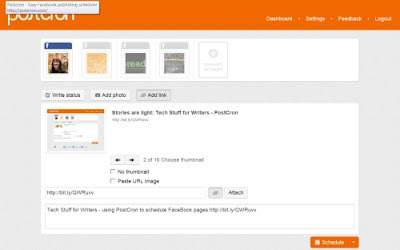 Press Schedule to set a date and time to schedule the post. Set and forget.
Press Schedule to set a date and time to schedule the post. Set and forget.
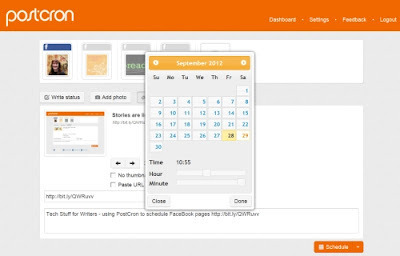
Sometimes my screen seems to hang but I just press F5 to redisplay and everything is as it should be. You can schedule multiple posts to different pages and to your profile wall. The free version has a limit of ten posts pending. Pending post are stored in tabs based on posting destination. Select the tab to see the scheduling details.
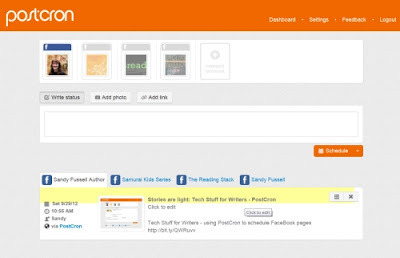
If for some reason a post fails, you get an email message and can reschedule or post manually. Too easy! If you found this useful leave me a comment and I'll share some more suggestions.

So welcome to PostCron. PostCron is a web application that allows you to schedule Facebook Posts. I find this useful because I often find things I want to post when I am researching or just checking my Google Reader feed but I don't want to interrupt my workflow to post them. I don't want to forget them either. I also want to post them when my friends and colleagues are most likely to be on-line.
So if I find something interesting on the web that I want to share on Facebook I immediately set up a PostCron entry. I keep the URL on my Favourites bar so the whole process takes a few minutes.
The URL for Postcron is postcron.com. I login with facebook which means some details look after themselves. I choose the free version. It has everything I need.
The post screen is set up very similar to a Facebook post. Nothing new to learn here! Text, pictures and links are entered the same way. The only difference is you have a choice of your Facebook Pages or your Profile Wall as the post destination. You can post to more than one destination concurrently. In this screen I have selected my Sandy Fussell Author Page.
After entering the text and attaching an image ot link, the post will be previewed.
 Press Schedule to set a date and time to schedule the post. Set and forget.
Press Schedule to set a date and time to schedule the post. Set and forget.
Sometimes my screen seems to hang but I just press F5 to redisplay and everything is as it should be. You can schedule multiple posts to different pages and to your profile wall. The free version has a limit of ten posts pending. Pending post are stored in tabs based on posting destination. Select the tab to see the scheduling details.

If for some reason a post fails, you get an email message and can reschedule or post manually. Too easy! If you found this useful leave me a comment and I'll share some more suggestions.
Published on September 27, 2012 06:49
September 23, 2012
My Favourite Blog Posts - Words to make sense of myself and the wonderful world we live in... Walk A Book Blog - Michael Earp
I love words. I love them by themselves (how great is snizzle - a drizzle of snow) but I love them even more when they are strung together to create beautiful images, amazing action or gut-wrenching feelings. They transport me. They get in my eyes and my ears with a wonderful euphoria of drowning in someone else's vision. And often they make me wishful and wish I was the one who wrote them.
I am avid reader of blogs and collector of quotes. Imagine my excitement to find a blog post full of word images, drawn from many of my favourite books. It's one of my all time favourite blog posts. It lives on the Walk A-Books blog and you can find it here.
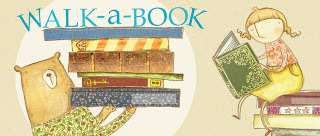 It's written by Michael Earp who blogs as The Little Elfman and you can find him here.
It's written by Michael Earp who blogs as The Little Elfman and you can find him here.
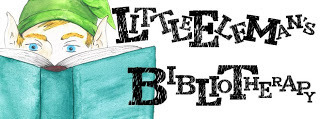
And now for a sample: In a way I’m addicted to the way words have power over us.

I am avid reader of blogs and collector of quotes. Imagine my excitement to find a blog post full of word images, drawn from many of my favourite books. It's one of my all time favourite blog posts. It lives on the Walk A-Books blog and you can find it here.
 It's written by Michael Earp who blogs as The Little Elfman and you can find him here.
It's written by Michael Earp who blogs as The Little Elfman and you can find him here.
And now for a sample: In a way I’m addicted to the way words have power over us.
She liked the word ineffable because it meant a feeling so big or vast that it could not be expressed in words. And yet, because it could not be expressed in words, people had invented a word to express it, and that made Liesl feel hopeful, somehow. – Liesl & Po, Lauren Oliver <<<...read more...>>>
Published on September 23, 2012 08:23



